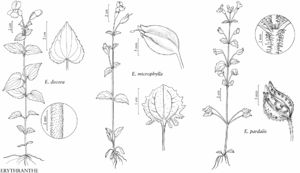Difference between revisions of "Erythranthe decora"
Phytoneuron 2012-39: 43. 2012.
FNA>Volume Importer |
FNA>Volume Importer |
||
| Line 37: | Line 37: | ||
|elevation=1000–1600 m. | |elevation=1000–1600 m. | ||
|distribution=B.C.;Idaho;Oreg.;Wash. | |distribution=B.C.;Idaho;Oreg.;Wash. | ||
| − | |discussion=<p>Erythranthe decora is distinct in its uniformly ovate to ovate-lanceolate leaf blades with truncate bases and regularly toothed margins, relatively long internodes, rhizomatous habit, mostly unbranched stems, often with leafy runners from basal nodes, large corollas, hairy styles, and minutely hirtellous stems, pedicels, calyces, and leaf surfaces. The densely produced rhizomes suggest a relationship with the E. tilingii group. A population in Clearwater County, Idaho, appears to be long-disjunct from the main range of the species in northwestern Oregon and the western half of Washington.</p> | + | |discussion=<p><i>Erythranthe decora</i> is distinct in its uniformly ovate to ovate-lanceolate leaf blades with truncate bases and regularly toothed margins, relatively long internodes, rhizomatous habit, mostly unbranched stems, often with leafy runners from basal nodes, large corollas, hairy styles, and minutely hirtellous stems, pedicels, calyces, and leaf surfaces. The densely produced rhizomes suggest a relationship with the <i>E. tilingii</i> group. A population in Clearwater County, Idaho, appears to be long-disjunct from the main range of the species in northwestern Oregon and the western half of Washington.</p> |
|tables= | |tables= | ||
|references= | |references= | ||
| Line 61: | Line 61: | ||
|publication year=2012 | |publication year=2012 | ||
|special status=Selected by author to be illustrated;Endemic | |special status=Selected by author to be illustrated;Endemic | ||
| − | |source xml=https://jpend@bitbucket.org/aafc-mbb/fna-data-curation.git/src/ | + | |source xml=https://jpend@bitbucket.org/aafc-mbb/fna-data-curation.git/src/8f726806613d60c220dc4493de13607dd3150896/coarse_grained_fna_xml/V17/V17_1340.xml |
|genus=Erythranthe | |genus=Erythranthe | ||
|species=Erythranthe decora | |species=Erythranthe decora | ||
Revision as of 14:58, 18 September 2019
Perennials, rhizomatous, sometimes producing numerous, long, remotely leafy runners from basal cauline nodes. Stems erect, simple, 20–100 cm, distals densely, minutely hirtellous. Leaves cauline, basal usually not persistent; petiole: proximals 8–25 mm, midcauline 3–5 mm, distalmost 0 mm; blade palmately (3–)5–7-veined, broadly ovate-triangular to ovate-lanceolate, 20–50(–60) × 10–30(–40) mm, usually 1–2 times longer than wide, base rounded to truncate to shallowly cuneate, margins dentate, teeth sharp-pointed, apex acute, surfaces sometimes glabrate, distals densely, minutely hirtellous. Flowers herkogamous, (1 or)2–7(–14), from distal nodes. Fruiting pedicels 18–35(–40) mm, distals densely, minutely hirtellous, hairs often slightly deflexed. Fruiting calyces green, sometimes red-spotted, ovoid, inflated, sagittally compressed, 15–19 mm, distals densely, minutely hirtellous, throat closing, lobe margins (sinuses) villous. Corollas yellow to chrome yellow, throat floor and tube usually red-spotted, bilaterally symmetric, bilabiate; tube-throat broadly funnelform, 18–26 mm, exserted (8–)10–15 mm beyond calyx margin; limb expanded 22–30 mm. Styles minutely, prominently hirsutulous to villosulous. Anthers included, glabrous. Capsules included, 8–10 mm.
Phenology: Flowering May–Aug.
Habitat: River banks, streamsides, dripping banks, moist meadows.
Elevation: 1000–1600 m.
Distribution
B.C., Idaho, Oreg., Wash.
Discussion
Erythranthe decora is distinct in its uniformly ovate to ovate-lanceolate leaf blades with truncate bases and regularly toothed margins, relatively long internodes, rhizomatous habit, mostly unbranched stems, often with leafy runners from basal nodes, large corollas, hairy styles, and minutely hirtellous stems, pedicels, calyces, and leaf surfaces. The densely produced rhizomes suggest a relationship with the E. tilingii group. A population in Clearwater County, Idaho, appears to be long-disjunct from the main range of the species in northwestern Oregon and the western half of Washington.
Selected References
None.
